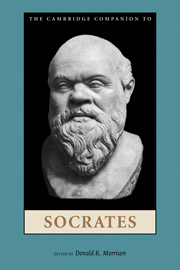Book contents
- Frontmatter
- 1 The Rise and Fall of the Socratic Problem
- 2 The Students of Socrates
- 3 Xenophon and the Enviable Life of Socrates
- 4 Socrates in Aristophanes’ Clouds
- 5 Socrates and the New Learning
- 6 Socratic Religion
- 7 Socrates and Democratic Athens
- 8 Socratic Method
- 9 Self-Examination
- 10 Socratic Ignorance
- 11 Reconsidering Socratic Irony
- 12 Socratic Ethics and the Socratic Psychology of Action
- 13 Socrates and Eudaimonia
- 14 Socrates’ Political Philosophy
- 15 Socrates in Later Greek Philosophy
- Socrates Bibliography
- Index of Names and Subjects
- Index of Passages
14 - Socrates’ Political Philosophy
Published online by Cambridge University Press: 28 March 2011
- Frontmatter
- 1 The Rise and Fall of the Socratic Problem
- 2 The Students of Socrates
- 3 Xenophon and the Enviable Life of Socrates
- 4 Socrates in Aristophanes’ Clouds
- 5 Socrates and the New Learning
- 6 Socratic Religion
- 7 Socrates and Democratic Athens
- 8 Socratic Method
- 9 Self-Examination
- 10 Socratic Ignorance
- 11 Reconsidering Socratic Irony
- 12 Socratic Ethics and the Socratic Psychology of Action
- 13 Socrates and Eudaimonia
- 14 Socrates’ Political Philosophy
- 15 Socrates in Later Greek Philosophy
- Socrates Bibliography
- Index of Names and Subjects
- Index of Passages
Summary
I believe that I’m one of a few Athenians – so as not to say I’m the only one, but the only one among our contemporaries – to take up the true political craft and practice the true politics. This is because the speeches I make on each occasion do not aim at gratification but at what’s best.
SocratesEspecially in the modern age, Socrates is sanctified as a defender of free speech, honest and relentless inquiry, and the love of truth. Other philosophers too have shared these commitments. But Socrates stood up for them at the cost of his own life. In enacting his commitments as he did, Socrates became more than a theorist: in some sense, he was also an actor on the political stage.
In light of the enormous difficulties inherent in the effort to locate either the philosophy of the historical Socrates, or a Socratic philosophy about whose content the major ancient authors on Socrates agree, in this chapter I will confine myself principally to the Platonic “Socrates.” When referring to “Socrates,” I mean the Socrates of Plato’s dialogues. I have taken note of several interesting and relevant points of contact with other portrayals of Socrates where doing so is useful to my discussion. While confining myself mainly to the Platonic Socrates, I shall, unless otherwise noted, suspend judgment about the relation between Plato and Socrates.
- Type
- Chapter
- Information
- The Cambridge Companion to Socrates , pp. 333 - 354Publisher: Cambridge University PressPrint publication year: 2010

